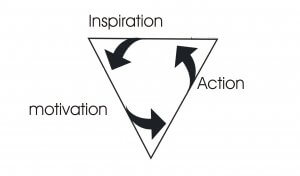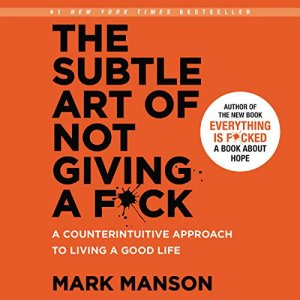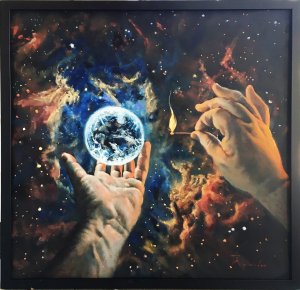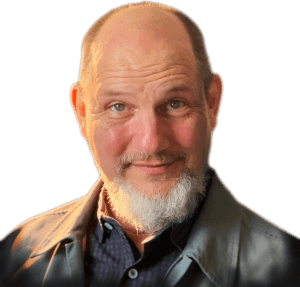Reading “The Subtle Art of Not Giving a F*ck” by Mark Manson, reinforced a few core principals for me
The book read like a fully fleshed-out version of the RM Theory, a survival philosophy I devised in High School. As George Orwell said in 1984, “a good book tells you what you already know.” I was drawn right away to the book’s dispersion of The Law of Attraction, with which I have always had trouble. Positive thinking is a catch 22 (another great book!). The reason we are positive we are going to receive a windfall of money is because we are obsessed with how poor we are, which is not very positive at all. As I explored in Quench, and to some extent here, it is more about regulating our desires, than getting what we want.
I found Manson’s premise quite refreshing and in tune with my experience living the artist’s life, even as his book focuses on relationships. There are some universal kernels of truth; it is not your typical self-help book. I highly recommend the read. The premise of the book is simple: we are called to carefully choose what to give a f*ck about. If we don’t choose our causes, they will choose us. We must be intentional about the f*cks we give.
We must give a fuck about something greater than the adversity standing in the way of our getting it.
Adversity is inevitable. But happiness does not come from getting what you want. True happiness occurs only when you find the problems you enjoy having and enjoy solving.
For those of us who have an early trauma story, I was reminded to be careful of the victim mentality. Blaming others leads to addictions, which serve only to cover the underlying problem. Like many, I struggle with thought addictions. I have struggled with the thought that “no matter what I do, I’m damaged goods.”
He doesn’t name it, but he talks a lot about Cognitive Behavioral Therapy concepts, where we are trained to challenge our thoughts, feelings and behaviors. We must become the driver of our thinking. For instance, if I feel crappy it’s because my brain is telling me that there’s a problem that’s not being addressed or remains unresolved. Feelings are a call to action. But just because something feels good does not mean it is good. And just because something feels bad doesn’t mean it is bad. He talks about getting off the “Hedonick treadmill,” that feeling that no matter what I do or feel I always end up feeling inadequate.
We need not focus on what we want to do in life. But rather, what pain we are willing to struggle with to get it. As counter intuitive as it may sound, happiness requires struggle. It grows out of solving problems. It lies in the acceptance of and active engagement with of our negative experiences, not the avoidance of them or our salvation from them. He makes a bold assertion about chasing our dreams. The coldhearted truth of the matter, is the reason we didn’t achieve our dreams is because we didn’t actually want them. We see what we really wanted more easily in retrospect, based on what we actually did. We always end up doing what we want. The liberating truth about all those unrealized goals and dreams is not that we failed to achieve them. There is freedom in realizing we really weren’t as in love with the process required for achieving our unrealized dreams. For me, that was my music. I didn’t end up a musician because I didn’t really, deep down, enjoy the process of being a musician. It’s not a fail to stop doing what doesn’t make us happy.
I like what he says about entitlement. Entitled people exude a delusional degree of self-confidence. They convince you they are brilliant even when they’re not. They make themselves feel good at the expense of everyone else. They are only fooling themselves. Entitlement is just another high. Just another trap that steals our happiness. Our actions don’t matter that much in the grand scheme of things. Manson advises us to take the pressure off ourselves, of having to be the next big thing. Relish in the ordinary because that is what actually matters. That is where we spend our days.
We are our values
If suffering is inevitable then we should not ask “how do I stop suffering?“ But “why am I suffering – for what purpose?“ Again, we must give a fuck about something greater than the adversity standing in the way of our getting it. He suggests taking an inventory of:
- What makes me happy?
- What makes me sad?
- What gives me hope?
We live our lives by our values. What we focus on is what we value. Many people value suffering, what I call the Van Gogh Syndrome. We need to ask ourselves some tough questions. Do I blame others for being lonely, “unsuccessful,” or in pain? Do I value beating myself up or blaming myself? Why do I want to be rich and famous? Why do I beat myself up for not making enough money? Do I value not being good enough? Being broken? Why do I think it’s true that I am a failure?
It’s important to realize, there is nothing special or unique about my problems. We are better served by giving up our grandiosity about our uniqueness.
Here’s a great piece of insight: the more a task (or job) threatens my identity the more I will avoid doing it.
Manson asserts what we value determines the nature of our problems, which determines the quality of our lives. Is the value of my success determined how much money I make? How many likes or shares or attention I get on socials? How many books or art I sell?
We all value success. It is the metric that is the issue. If it is determined by money, likes, sales, attention, then we may be condemning ourselves to a life of misery. Why do these metrics seem so compelling? Isn’t success really the freedom to do what you love?
Another value he talks about is intimacy. One metric for a good relationship is intimacy. Do we measure that by how many orgasms we have with our partner? Are we comparing ourselves to what we see in a pornography? Isn’t intimacy more about honest talk (sharing), love talk, back rubs, quality time. We need to ask why these other, more destructive images, seem true? Or rate how true statements like these are about whatever value we are talking about. CBT leads to self awareness. Even more important then what is true is how we measure why it’s true.
We are Meaning Making Machines
We get to measure the meaning of each problem and control what they mean based on how we choose to think about them, how we measure them. If we measure ourselves against others, the question is by what standard do we measure?
To really change how I see my problems I will have to change what I value and how I measure my failure/success.
Here are values that will lead to misery:
- pleasure
- Material success.
- Being right all the time
- Staying positive. Constant positivity is a form of avoidance. To deny problems is to perpetuate them, rather than solve them. Solving problems is what generates happiness. [Positivity at all costs is a disease. Positivity is more about action than feeling of optimism.]
People who are terrified of what people think of them are really afraid of what they think about themselves being reflected back to them.
Healthy values are:
- reality-based
- socially constructive and
- immediate and controllable.
Examples of healthy values include
- honesty
- innovation
- vulnerability
- integrity
- self-respect
- curiosity
- creativity
- charity
- humility
- productivity
- compassion.
Unhealthy values are:
- superstitious
- socially destructive
- not immediate and controllable
Some examples are:
- dominating others
- manipulating
- promiscuity
- pleasure seeking
- being the center of attention
- never being alone
- being liked by everyone
- being rich at any cost.
- Being successful so that everyone will love me (because I really think I’m not lovable).
Mark Manson highly recommends incorporating these Five values into our lives:
- Take responsibility for everything in your life. We don’t always control what happens to us but we always control how we CHOOSE to interpret and respond to it. What do we choose to give a fuck about? With great responsibility comes great power. Taking responsibility does not mean I’m accepting fault. Fault is past tense. Responsibility is present tense. I can blame another but only I can take responsibility for how I feel about it.
- Acknowledge my own ignorance and question my beliefs. Choosing to not respond to the events in our lives is still a response to the events in our lives. Alleviating responsibility by blaming others gives a temporary (but inevitably false) sense of self righteousness. (From Rachel Reed: “Some are terrified of truly good people because they’ve built a life trying to prove good doesn’t exist, so the bar of decency can stay low enough for them to feel comfortable rather than rising to the occasion.”)
- Be willing to fail and improve upon my flaws. Questioning myself as a mental habit. Not to hate myself. What does it mean to be wrong? Aristotle: “be able to entertain a thought without accepting it.”
- Learn to accept rejection. In fact, embracing it. Success is based upon a 1000 tiny failures; the magnitude of your success is based on how many times you’ve failed.
Facebook exposes us to stellar successes; and leaves out the thousands of hours of dull and tedious practice it took to achieve it.
Goal: express myself honestly. Stop indulging in entitlement and delusional positive thinking.
Example: Just because it feels like painting must be difficult doesn’t mean that it actually is.
The “Do something” principal.
We often think that inspiration leads to motivation, which leads to action. He points out we can start anywhere in this cycle, not necessarily with inspiration. Sometimes we must start with action rather than wait for inspiration. .

To truly appreciate something, you must confine yourself to doing it.
He focuses on Relationships, astutely noting that the yin yang of people who start fires end up with people who get off on putting fires out. When presented with emotionally healthy people to date those without healthy boundaries often find them boring or lacking in “chemistry.” It’s probably not a good idea to use chemistry as a dating criteria. People with strong boundaries are not afraid of temper tantrums, arguments or getting hurt. It’s not about giving a fuck about everything your partner cares as about. But rather caring about her regardless of what she gives a fuck about. Trying to make my partner or myself happy all the time usually results with nobody feeling good.
Without conflict there can be no trust.
I always say, “cleaning up the messes from our conflicts actually builds trust and deepens the relationship. We must learn the art of saying no. Without trust there can be no love. Cheaters care more about themselves than their relationship.
Paradox of choice: the more choices we have the less satisfied we are with our eventual choice. Commitment to a choice delivers rewards over time. Pursuit of the constant breadth without depth leaves us empty.
5. Contemplate mortality
Life is empty and meaningless. Therefore it is empty and meaningless that it’s empty and meaningless. Death is the light by which the shadow of all life’s meaning is measured. Read “The denial of Death” by Ernest Becker, who writes about:
- Death terror colors everything humans do.
- We need to separate our physical self (which we know will die) from out conceptual self (in which we try to convince ourselves that our influence will live forever).
Immortality Projects
All civilization is the result of various “Immortality projects.” All meaning is shaped by this innate desire to live forever. Immortality projects are are what form our values. We must question these projects, which also lead as many horrible outcomes as positive ones. Manson suggests it is better to become more comfortable with our physical mortality. What is your legacy? Death is the compass to which we orient our values. Being part of something larger than ourselves.
Entitlement isolates us and separates us by projecting our own biases onto ever experience. False Sense of superiority leads to stagnation. Afraid to try and fail.
There is a huge difference between greatness and notoriety. Greatness is found in choosing what values to care about and which not to. Greatness does not always lead to notoriety. Notoriety does not necessarily imply greatness.
Ironically, it is my obsession with my own mortality that actually keeps me more alive. I strive for greatness, one great problem at a time.
After reading this book it occurred to me that it’s taken me a lifetime to destroy my career as an artist. To destroy something means to risk catastrophe at every turn. It means using it up in the service of an ideal. Even to engineer its destruction. To make it bend to your will. We must not be too precious with our gifts. Art and life are the continual process of destruction and renewal.



 Would you like to get inspiration in your inbox, rather than ads for more stuff? Welcome to ManiscalcoGallery.com
Would you like to get inspiration in your inbox, rather than ads for more stuff? Welcome to ManiscalcoGallery.com
I feel like I have read and understood the book; thanks for the posting. Fascinating recap.
Thanks. It helps me assimilate the message from the book to do this.